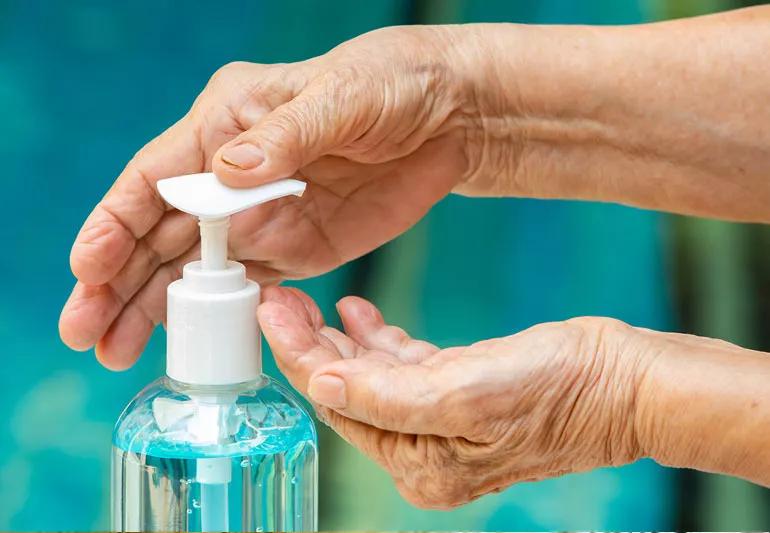An immunologist debunks this myth

Image content: This image is available to view online.
View image online (https://assets.clevelandclinic.org/transform/af84e9a0-0f59-4212-9bba-1282592d52e6/sanitizingImmunity-1212006615-770x533-1_jpg)
woman using hand sanitizer
In the quest to avoid the 2019 novel coronavirus, we’re going through bottles of soap and tubs of disinfectant wipes faster than some stores can restock them.
Advertisement
Cleveland Clinic is a non-profit academic medical center. Advertising on our site helps support our mission. We do not endorse non-Cleveland Clinic products or services. Policy
Along the way, there’s been some speculation on social media that all the hand-washing and disinfecting we’re doing in the name of keeping coronavirus away could be weakening our immune systems.
Are there really downfalls to being squeaky clean?
Allergist and immunologist James Fernandez, MD, PhD, says there’s no scientific evidence to suggest that temporarily stepping up your cleaning game is dangerous to your immune health.
“For adults, in this time frame we’re talking about and the hygiene measures that we’re taking, I don’t think there’s a lot of clinical risk to our immune system,” he says.
The belief that a lot of cleaning and hand-washing weakens your immune system was probably born out of something called the hygiene hypothesis. This is the idea that kids who are exposed to more viruses, bacteria and other pathogens early in life build stronger immune systems.
“This idea comes from observations that some developing countries where kids might be exposed to more pathogens tend to have lower rates of certain diseases such as allergies and asthma,” Dr. Fernandez notes.
But there’s still debate around this hypothesis – and how much of a role personal hygiene plays. “Theoretically it makes sense, but there isn’t a lot of strong science behind it,” Dr. Fernandez notes.
Advertisement
It’s also not meant to be interpreted as a sweeping generalization that more germs and less cleanliness is better.
Studies have repeatedly shown that keeping your hands clean is one of the best tools we have for reducing the spread of dangerous infectious diseases.
There are also many other factors that can affect your immune health that aren’t related to hygiene.
So here’s the big takeaway: There’s no evidence that a short-term boost in hand-washing and cleaning will reduce your body’s immune function.
To reduce the spread of the coronavirus and other infectious diseases, the CDC recommends washing your hands with soap and water after you’ve been in a public place or after blowing your nose, coughing or sneezing. If you need to wash your hands but soap and water aren’t available, use a hand sanitizer made with at least 60% alcohol.
Washing and sanitizing your hands a lot can leave your skin dry or cracked, so you might want to add a good moisturizing lotion to your hand-washing routine.
The CDC also recommends regularly cleaning frequently touched surfaces in your household, including doorknobs, light switches, counter tops and faucets.
Hygiene aside, there are many factors that play into how well-equipped your immune system is to fight infections. Some of those things are out of your control, such as age and genetics. But there are several things you can do to keep your defenses strong, including:
Advertisement

Sign up for our Health Essentials emails for expert guidance on nutrition, fitness, sleep, skin care and more.
Learn more about our editorial process.
Advertisement
Options like fatty fish, citrus fruits and sunflower seeds can help keep you well and heal faster
Common sense steps can give your child a healthy start
From boosting foods to lifestyle changes to a healthy attitude
It’s a great disinfectant for around your home, but not for your skin
Bathing once a day is the general guidance, but you could also have reasons to soap up twice a day or not at all
Eat your fill of vitamins C, B6 and E, plus zinc and selenium
You’re sharing your sheets with dust mites, bacteria and lots of dead skin, so you’ll want to keep your bedding fresh
You may notice itching, redness and swelling after wearing or using laundered items
Prioritize your health by managing stress, strengthening your social connections and getting quality sleep
Bolsters, blankets, pillows and blocks can offer extra support, stability and comfort
Allergies, postnasal drip, asthma or reflux could be to blame for a cough that won’t quit